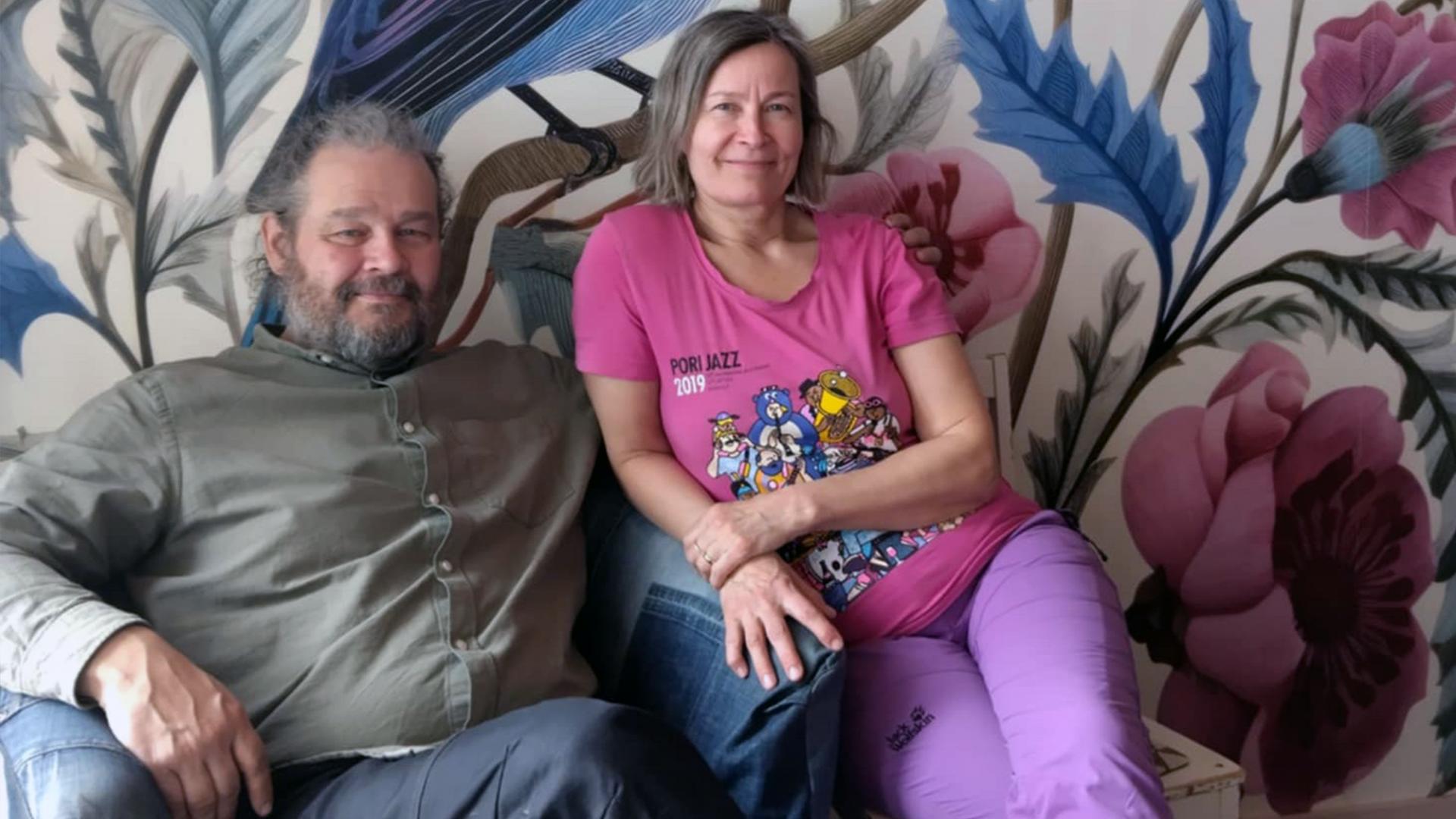Master shoemaker Virpi Jääskö and Master knifemaker Pasi Jaakonaho
I interviewed Virpi and Pasi at the couple's home in the church village of Inari. In the yard is a new joint workshop, built in a sea container. The well-planned workshop has two sections and for example, both use the same grinding machines. By combining their workshops, they have saved space, equipment and costs. At the same time, they now have each other's company.
Virpi Jääskö - Taveämmi
Virpi Jääskö has been making crafts all her life. She has learnt from others and in many courses. She has made clothes and mittens as needed. Virpi made the first traditional fur shoes, made from reindeer leg fur, over 35 years ago.
In 2013, Virpi went to Kankaanpää, where an education in bag sewing was to be organised, but it was cancelled. So it was shoes instead and she specialised in shoemaking. She first studied at the shoemaker's school to become an apprentice and then a master shoemaker. Virpi has the northernmost shoemaking workshop in Finland. She also does some repairs and other leather work, such as bags, but the focus is on orders for new shoes. Virpi also leads popular shoe sewing courses.
Taveämmi is the name of Virpi's company, it is in Inari Sámi and means northern wise woman. Virpi works with traditional shoe patterns in a modern way. The inspiration comes naturally from the need to create. Her favourite material is hand-tanned thin reindeer skin. Reindeer fur is beautiful and very warm, but labour-intensive and challenging as it grows up to 1700 hairs/cm2! The materials are locally produced and from the Nordic countries. Virpi does not use chrome tanned skins.
Virpi also runs the Arctic Craft School, which offers craft classes of varying lengths, combining traditional techniques and precious local materials with a modern design language. Do-it-yourself kits with materials are also available.
Inari is Virpi's home, where she was born and raised, but she can also imagine living somewhere else from time to time, as she likes travelling. The closeness to nature is clearly reflected in the choice of materials.
Virpi's beaked shoes are based on her own model where lines play an important role. The work is always customer-orientated, as each pair of shoes is a special order. She makes a lot of shoes for other artists, so collaboration plays a big role, allowing more room for creativity. The orders are driven by the seasons, just like life in the north.
Pasi Jaakonaho - Jaakonaho Arts & Design
Pasi Jaakonaho has a long experience in arts and crafts. Pasi was born in Haapajärvi. When he worked as a cleaner in a hospital in Helsinki in the early 90s, he thought that he could make his living by making crafts. It was also important that there was something other than monetary compensation to reward the work. So, he came to the Inari and Sámi Education Institute to study hard materials, i.e. working with wood and bone the Sámi way. The education also included silver and stone work.
His studies included an internship, which he did in Haukipudas with the blacksmith Heino Tuomivaara.
After that, he ran his own iron forge workshop in Simo for four years. In Kuopio he studied precious metals and in 2009 he moved back to Inari to teach. Pasi is also a trained designer from Savonia and in addition, he has completed both the journeyman and master knifemaker exams. He is one of the few master knifemakers in Finland. Alongside his work as a lecturer, he is currently working on a PhD in art and is a doctoral researcher. The topic is the Finnish puukko knife, and Pasi is the first in the world to research it.
Local natural materials play an important role, in fact they are the starting point. The collection of materials is continuous. Pasi makes mostly knives and they are built step by step and with feeling. Each of Pasi's knives are unique. The knives often contain reindeer antlers, which Pasi engraves by hand. The forging of the blade, the plasticity of the shaping and the power of the fire are the most fascinating aspects of his work. He does his creative work part-time, alongside his teaching job.
“Inari is the best place to live. The soul rests in the pure nature, which is a counterbalance to work. There is also a surprisingly rich and international culture here," says Pasi.
Pasi is award-winning and visits different knife fairs in Europe every year. He also makes other handicrafts. A quality birch burl kuksa (wooden cup) will last for generations. Pasi has been playing the guitar for a long time and recently he has been learning to make guitars at the Ikaalinen instrument-making school. Perhaps in the future he will also start making guitars.
Common challenges
I discussed with Virpi and Pasi the challenges of being self-employed in the creative sector. Both would like to see a more generous pension scheme for all cultural workers. They oversee many things and pass on knowledge and traditions. The couple would also like to see a network of workshops with machines and equipment to help new artisans get started in their profession. A model could be taken from Norway, where there are duodji (Sámi handicraft) institutes for this purpose. We also discussed the importance and values of quality, sustainability, domestic and Finnish labour.
Time is another thing that is not enough when you have a fair coming up and a lot of pleasant work going on. Process and materials are key for the two masters, and it feels good to be able to work with their hands. That's what they hope for future generations, that a spark will be ignited in young people when they get to know the working methods. For this, Konstrundan is a fantastic event. Virpi and Pasi welcomes visitors during Konstrundan to Inari during the beautiful autumn season!

